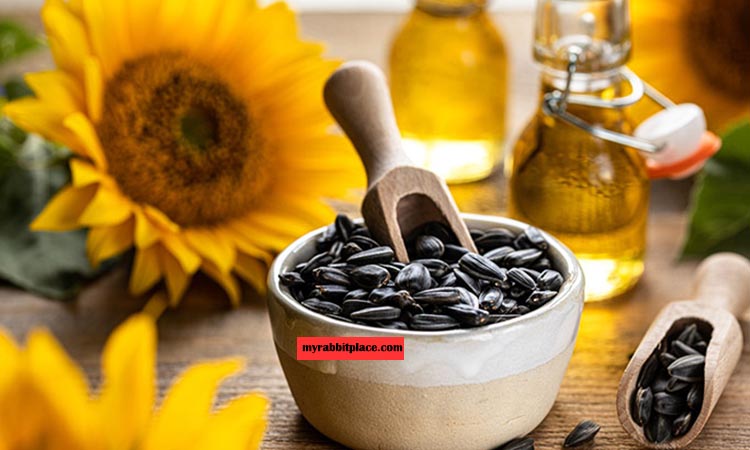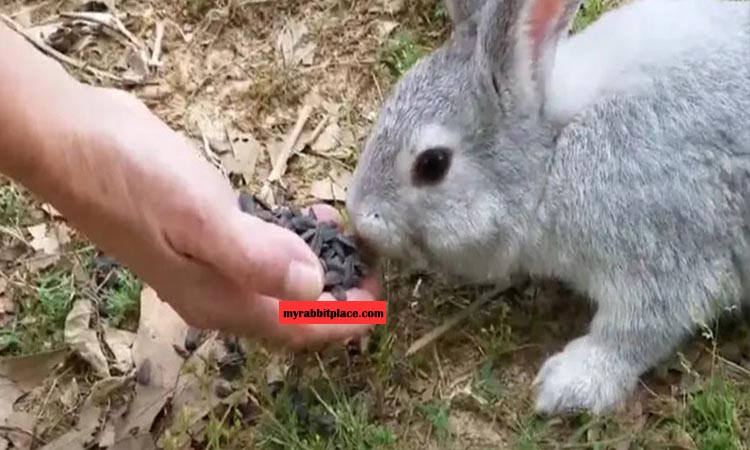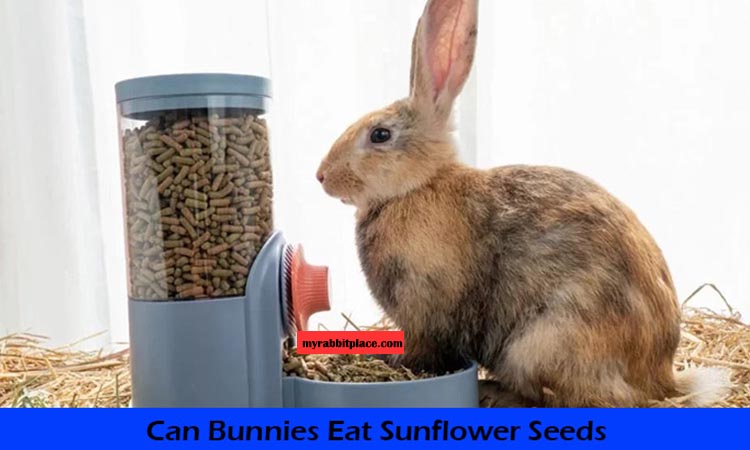As pets, those small and cuddly bunnies provide us with happiness by moving their noses and hopping adorably. As good owners of rabbits, we aim to give them the best care including food that suits their furry needs.
Another usual question that keeps coming up is ‘’can bunnies eat sunflower seeds’’. Our objective today is to thoroughly examine and explore this particular question. The following blog takes a closer look at rabbit nutrition and discusses whether these tiny seeds serve as an appropriate addition to their diet.
Our exploration will take us from understanding its nutritional composition to finding out potential advantages and disadvantages brought about by Can bunnies eat sunflower seeds? Join us in checking out some top things to make sure our bunnies are happy & healthy.
Can Bunnies Eat Sunflower Seeds?
Certainly, bunnies have the ability to eat sunflower seeds. For a rabbit, these seeds can prove a delicious snack provided they are sparingly given. These may be fatty foods and therefore indulging your rabbit in so many of them might result into obesity and other health issues. Also, avoid giving them salted sunflower seeds as rabbits do not require added salt.
Further still, there is a need to introduce different types of bunny food in their diet just to ensure that they get balanced nutrition. Prioritize checking your pet’s reaction to new treats like sunflower seeds and when with doubt consult a vet on possible nutritional concerns about the rabbit.
What are Sunflower Seeds?
Sunflower seeds are the edible seeds that come from the sunflower. They are located inside a particular part of the sunflower called seed head which looks like a big flower. There are various types of sunflower seeds: hulled or unhulled, roasted, and raw.

They rank highly among snacks for humans due to their health values and they are also widely used in cooking and baking. These seeds contain healthy fats, mainly monounsaturated and polyunsaturated fats, plus vitamin E protein and minerals such as magnesium and phosphorous.
Though Sunflower Seeds are a popular human snack you should keep in mind things like high salt content that need to be considered when using them on animals’ food for example rabbits.
Nutritional Benefits for Bunnies
Not too much, but sunflower seeds could provide some nutritional merits to bunnies. Here are the possible benefits:
Healthy Oils: Sunflower seeds consist of healthy oils like mono- and polyunsaturated fats, which are important for body energy and a shiny coat in rabbits.
Protein: Rabbits need proteins as they grow up. One source of plant-based protein is sunflower seeds. Teensy-weensy-proteins that help muscle tissue maintenance and development.
Vitamin E: Antioxidant is what sunflower seeds are in great supply. This vitamin strengthens the immune system and skin health in rabbits.
Minerals: The ones that have magnesium and phosphorus being among them would be sunflower seeds. They have an impact on bone formation as well as metabolic activities.
Moderation and Serving Recommendations
A moderate approach is crucial when it comes to sunflower seed treatment of rabbits. This implies that great care must be taken when deciding the number and intervals at which such sunflower treats are given so as not to compromise their health.
The idea here is to find a middle ground between providing for a great meal and avoiding potential risks that might arise due to overdose.
With the moderation and serving recommendations intact, you can make sunflower seeds not only make bunny’s eating experience enjoyable but also keep them healthy.
Potential Risks and Considerations
When feeding sunflower seeds to rabbits, there are potential risks and considerations that should be approached with care. These seeds have high levels of fat which can cause obesity and digestive problems if used in excess.
Moreover, what should be taken into account is; an imbalance between phosphorus and calcium, salted varieties including choking hazards posed by whole seeds. Also, the quality of the nutritional value can thus be tampered with after some time through oxidation of fats.
To prevent this situation from happening one has to hold back on offering sunflower seeds in plenty, select unsalted type or salted varieties without mustard greens & make sure to give them as part of your balanced rabbit food. Gradually introduce new foods and keep an eye on your bunny for any signs of reactions that will need medical attention.
Also Read - Can a rabbit eat Parsley?
How to Feed Sunflower Seeds to Your Bunny
When feeding sunflower seeds to your bunny, you should do so with some thought. To avoid health risks, select the unsalted hulled ones and give them sparingly as part of your rabbit’s overall diet. For safety reasons choose chopped or hulled seeds and mix them with pellets or sprinkle them them over hay for meals.

Also, use sunflower seeds as a reward in positive reinforcement training while observing for any signs of diarrhea or allergies in your bunny.
Freshness matters, therefore ensure that the seeds are kept cool and dry for optimal taste and nutritional value. These rules will help turn snack time into an enjoyable experience that respects both the rabbit’s health and well-being.
Observing Your Bunny’s Response
Sunflower seeds are given as food for your rabbit, look out for his response to see whether it is in good shape. Abdominal health, for instance, watery faeces or upset stomachs and changes of moods like laziness and excessive movements which may be signs of being not comfortable.
Some signs of allergy that you should check are itching and swelling. You need to weigh your rabbit regularly because these seeds contain a lot of fats that can easily lead to weight gain. Hydrate well, especially when feeding them salted ones because too much salt increases thirst.
If anything seems amiss, waste no time but consult a specialist veterinarian who will direct you on the best diet that suits your rabbit’s individuality with an eye to its welfare always.
Also Read - Can Rabbits Eat Plums? Learn About Plums Nutritional Benefits here.
Alternatives to Sunflower Seeds
There are a number of alternatives to sunflower seeds that can provide nutritional benefits to your bunny while helping you add some variety. Here are some alternatives:
Pumpkin seeds: These will offer nutrition as well as taste. Remember to avoid salted types and only in moderation.
Chia Seeds: They may look tiny but they contain omega-3 fatty acids that help the heart function properly and improve digestion. Sprinkle them on top of the food.
Flaxseeds: This is because rabbits have a high need for omega-3 fats in their furs to remain healthy.
Sesame Seeds: Another special characteristic of them is that they have high calcium content that makes them significant supplementary in animals’ diets. Nonetheless, one should not give too many as they are high in fat.
Dandelion Greens: thereby providing essential nutrients as well as introducing more taste into the menu of bunny rabbits.
Carrot Tops: They add minerals and vitamins without adding calories, which is why they are healthy alternatives to other food options available.
Basil: This herb can be used as part of your bunny’s feeds hence adding flavor or smell.
Cilantro: It is another herb that Rabbits will eat, it has its own unique flavor making it an outstanding choice especially if want to vary the taste plus provide some basic nutrients.

FAQ
Are sunflower seeds safe for bunnies?
Of course, rabbits can chew on sunflower seeds. Nevertheless, it is important to give just small amounts of unsalted ones without sodium since an excess of salt could be poisonous to the organism.
Is it healthy for bunnies to eat sunflower seeds?
Giving sunflower seeds to rabbits once in a while is fine. Sunflower seeds provide essential fats, proteins, vitamin E and minerals. However, one must be careful with the quantity because they contain a significant amount of fat.
Can rabbits eat whole sunflower seeds?
Giving your bunny dehulled or chopped rather than whole sunflower seeds would be good as it would reduce choking hazards. In this way, your bunny will feed safely.
How often should I give my rabbit sunflowers?
Sunflowers are considered treats rather than regular daily meals for your pet rabbit; so do not offer them daily. Give only a small amount of them a few times per week.
Do rabbits like salted sunflowers?
Rabbits should never eat salted sunflowers since excessive salt is dangerous to them. Choose unsalted types to ensure the safety of your rabbit.
How do I add sunflower seed into my rabbit’s diet?
Gradually introduce it, and watch your bunny’s feedback. Also, observe your bunny for any digestive problems or allergies. If worried consult a vet who will give specific advice about your rabbit’s diet.
Conclusion
Our exploration as to whether or not bunnies can eat sunflower seeds establishes that although these seeds may be a tasty complement to their diet, it is crucial to follow responsible feeding guidelines. This begins with knowing the nutritional content of these seeds, serving suggestions and observing your pet’s response to them.
In so doing, their occasional indulgence becomes an aid in their well-being and cheerfulness. It is always important to consult with a veterinarian since they will give you personalized information about what to feed your bunny.


